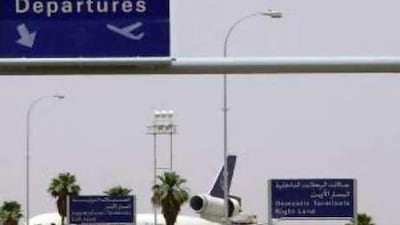Pushed to the brink of bankruptcy just a few months ago, Sama, the Saudi budget airline, sees clearer skies on the horizon after the government has begun relaxing regulatory policies. The General Authority for Civil Aviation (GACA) has over the past year gradually loosened the rules governing Sama and Nas Air, two carriers which were granted licences in 2006 to operate low-cost carriers in the kingdom, breaking the decades-old monopoly held by Saudi Arabian Airlines (Saudia). The restrictions included a cap on fares, a requirement for each airline to fly to more than 20 of Saudi Arabia's smaller cities, and a two-year ban on flying the more profitable international services in order to protect Saudia.
The relief comes as airlines are slowly recovering from crippling oil prices this summer, and now face a slowdown from a possible global recession. On Tuesday, Walter Prenzler, the new chief executive for Nas Air, said his airline was looking at making "adjustments" to this ambitious expansion programme given the present market conditions. Sama operated these "public service" routes to smaller cities throughout the country as recently as this summer, and some were so unpopular that the airline carried only one passenger. The restrictions were so onerous that Andrew Cowen, the chief executive of Sama, said recently the airline might be forced to shut down its domestic operations after making a loss of US$10,000 (Dh36,700) per flight. Mr Cowen's unusually public appeal to authorities may have been spurred by concerns from its private backers, who have sunk $133 million into the venture so far. "Our shareholders made clear they are not prepared to lose money," Mr Cowen said yesterday on the sidelines of an aviation conference in Al Ain.
However, a series of rule reversals by the government has created breathing room for the Dammam-based airline. Last winter, GACA repealed its two-year ban on flying internationally and allowed Sama and Nas Air to fly outside the country. Mr Cowen quickly launched flights to 11 cities in the Gulf and surrounding region, including Abu Dhabi, Sharjah and Beirut, and this month will initiate a flight to Mumbai, its first route in the subcontinent. The flights have been free of the domestic fare cap, allowing Sama to reap a tripling of revenues per seat. The start-up carrier is adding aircraft to serve these international routes, and expects to have up to 25 aircraft by 2010.
"We were risking having an enormous amount of capacity tied up in routes that had no economic value," Mr Cowen said. This summer, the new budget carriers received more good news. GACA began loosening rules on mandatory routes, and the number of mandatory routes Sama served within the kingdom has been cut, from 23 down to five. Mr Cowen said he was optimistic GACA would amend the domestic price cap, which had been the most damaging restriction of all.
The fare cap was first decreed about 2000 as a way to protect the public against unfair pricing by the sole domestic operator, Saudi Arabian Airlines. Currently, the typical domestic fare in Saudi Arabia is about one third of the level it should be in a market without a cap, according to estimates. But the government is now reviewing the cap, which the Sama chief executive lauded as a positive development. "The airlines are not just moaning," Mr Cowen said.
Historically, budget airlines have stimulated new demand for air travel, something he said would benefit all the residents of the Gulf. "There are so many cities where you have little choice and fares are high around the region." igale@thenational.ae

